[Updated 1 January 2024] A crossbow is a tool that has been around for hundreds of years; it’s gone through many changes in that time, but the overall design has remained the same. A crossbow is like a bow, and a gun had a baby. It is a trigger action bow that is designed to fire arrows faster and with more accuracy than a traditional bow. The crossbow weight holds significant importance when hunting and even simple target practice.
The first question when looking for a crossbow is; how much does a crossbow weigh?
Thanks to their design and all the parts needed to make a crossbow work, they are a lot heavier than a traditional bow. The lightest a barebones crossbow will be is around six pounds, but a crossbow that is loaded with features can reach upwards of fifteen pounds. In most cases, the average crossbow weighs somewhere in the seven-pound range. Knowing your crossbow’s weight is crucial because it will affect the overall function of the bow.
How Much Does Crossbow Weight Matter?
Table of Contents
Crossbow weight is vital for several reasons, but accuracy is the most important. A heavy crossbow will cause fatigue and make it harder to aim. Even when you are feeling fresh, a heavy bow forces you to fight gravity to stabilize your shot. Every time you bring your crossbow up to aim, you are forcing your muscles to do more work and eventually tire out, making it hard to stabilize your bow.
It is important to note that there is a difference between the physical weight of the bow and the draw weight. The draw weight is the amount of force it takes to pull back the arrow and does not directly affect the weight of the bow. A higher draw weight will cause extra fatigue, though, especially in a crossbow, which takes more work to pull back than a traditional bow. Most crossbows can be slung around your back, but if not, the weight of this device will affect your stamina as well as your arms strength.
Is There a Right Weight for Crossbows?
The right weight for your crossbow will come down to personal preference, so there is not empirically correct weight for a crossbow, but there are a few things to think about when finding the right weight for yourself.
A lightweight bow will cause less fatigue and make hip firing faster, but not as accurate. However, a heavier bow will have less recoil when shooting, which will help with accuracy. Heavier crossbows often need to be rested on a steady surface for the best accuracy since you have to fight gravity while you aim.
Is Tuning Your Crossbow More Important than Weight?
The weight of your crossbow has a direct impact on your aim, but an untuned bow has a much larger impact on your accuracy as well as the fatigue factor. An untuned bow can add more recoil to your shot and has the potential to be dangerous if a part fails mid-shot. Tuning your bow is simple and should be done every time you use it. Follow these steps to ensure your health and safety, as well as your bow’s longevity. 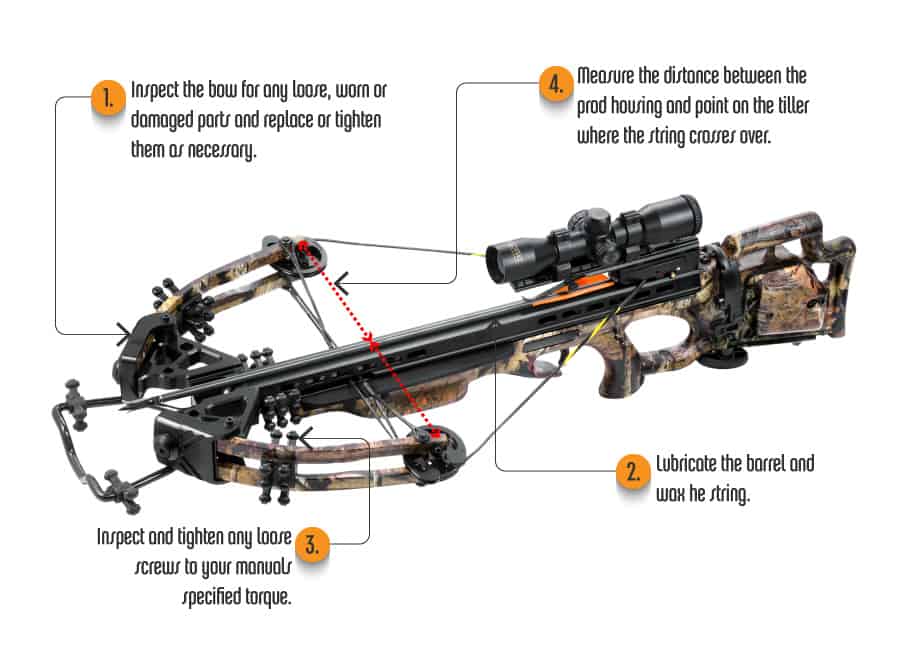
- Look over your bow for any worn, loose, or damaged parts and replace them as necessary.
- Lubricate the barrel and wax the string.
- Tighten any screws that may have loosened from shot vibration.
- Adjust your crossbow’s tiller. This is the balance between the pull of both arms of the crossbow. Measure the distance between where the limb meets the prod housing and the string. Do this on each side of the prod housing, and if the measurements are not the same, you have to adjust the till. Compound crossbows usually have a bolt that allows you to adjust the tiller, but a recurve crossbow will most likely need to have its limbs replaced.
Accessories and Their Average Weights
The final weight of your crossbow will depend on the number of attachments you are using and how much they weigh individually.
Scope
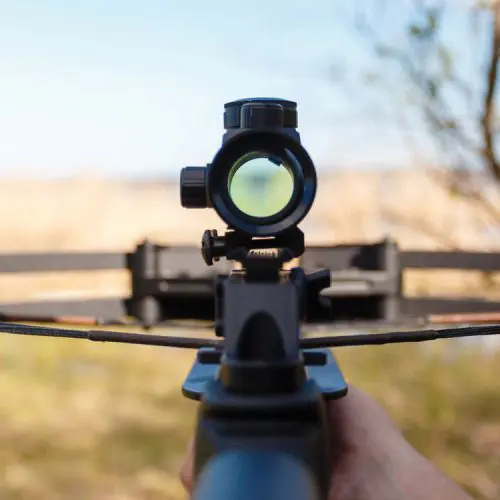 Scopes are the heaviest accessory that you can put on your crossbow, but they are also the most important. Scopes range anywhere from a few ounces to three plus pounds. The average scope weight is between one and two pounds, but a three-pound scope is not as rare as one may think.
Scopes are the heaviest accessory that you can put on your crossbow, but they are also the most important. Scopes range anywhere from a few ounces to three plus pounds. The average scope weight is between one and two pounds, but a three-pound scope is not as rare as one may think.
Crossbow Sling
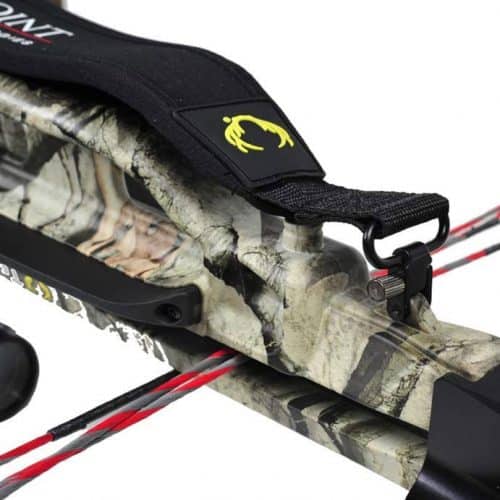 The sling is an accessory that could be considered a negative weight accessory. Even the heaviest of slings weigh– a few ounces, but they allow you to carry the bow on your back, lessening the fatigue if places on your arms.
The sling is an accessory that could be considered a negative weight accessory. Even the heaviest of slings weigh– a few ounces, but they allow you to carry the bow on your back, lessening the fatigue if places on your arms.
Limbsaver Dampeners
These devices lower the vibration from firing, which saves your string and your arms. These devices range in weight anywhere from less than an ounce to around six ounces.
Quiver
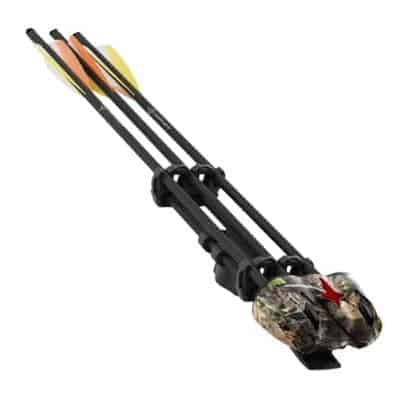 An attachable quiver is extremely convenient for quick reloading, but it does add weight to your bow. The quiver itself weighs less than a pound, but depending on the weight of your arrows, it can get a lot heavier.
An attachable quiver is extremely convenient for quick reloading, but it does add weight to your bow. The quiver itself weighs less than a pound, but depending on the weight of your arrows, it can get a lot heavier.
Does Bow Material Matter?
The material used in the manufacturing of your bow matters a lot more in a crossbow than it does in a traditional bow because there are so many more moving parts to a crossbow. Of course, the manufacturer’s number one priority is a bow that will stand up to the rigors of hunting, but a cheaper bow may use durable material that sacrifices weight. At the same time, if you spend a little more money, you can get the same durability out of a lighter weight material.
Other Things to Consider About Bow Weight
Does Arrow Weight Matter?
Arrow weight does not matter as much with a crossbow as they do with a traditional bow because there is so much force behind a bow. Where arrow weight does matter with a crossbow is if you choose to quiver multiple arrows on your bow.
How Do I Prevent Fatigue?
The easiest way to prevent fatigue when using your crossbow is to employ the use of a sling to carry your crossbow when not in use. The other thing you can do is to work out the muscles that are easily fatigued by crossbow use through weight lifting or continuous repetitive motion. Either way will help to give those muscles more stamina and prevent fatigue for more extended periods.
Can You Lighten a Crossbow?
Unlike compound and traditional bows that are more or less a single piece, crossbows have replaceable parts, so it is possible in theory to lighten your bow by replacing the limbs with lighter versions.
In the End
The weight of a crossbow is incredibly important to your experience with it. It weight affects everything from how it feels in your hands to how accurate you are. A crossbow gives you a little more leeway with customization, but it also has the potential to be a lot heavier than a traditional bow.


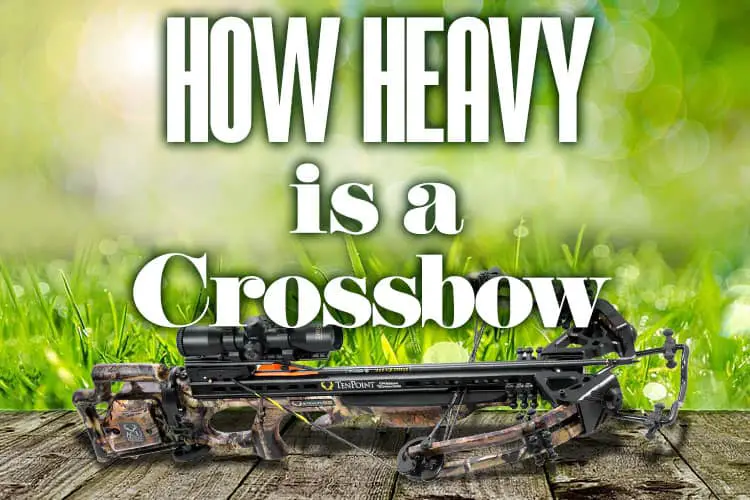





8 Comments
Pingback: How Heavy is a Compound Bow - Boss Targets Archery Bows
Pingback: Best Archery Backstop Nets for 2021 - Boss Targets
Pingback: Learn about the Various Types of Bows - Boss Targets
Pingback: Discover the Many Types of Bows - Boss Targets
Pingback: Best Fletching Jigs - Complete Buyers Guide - Boss Targets
Pingback: All You need to know about Bow Hunter Education and Classes
Pingback: Bow Hunting License Info and Tips - Boss Targets
Pingback: Trophy Ridge React Pro Bow Sight Review - Boss Targets